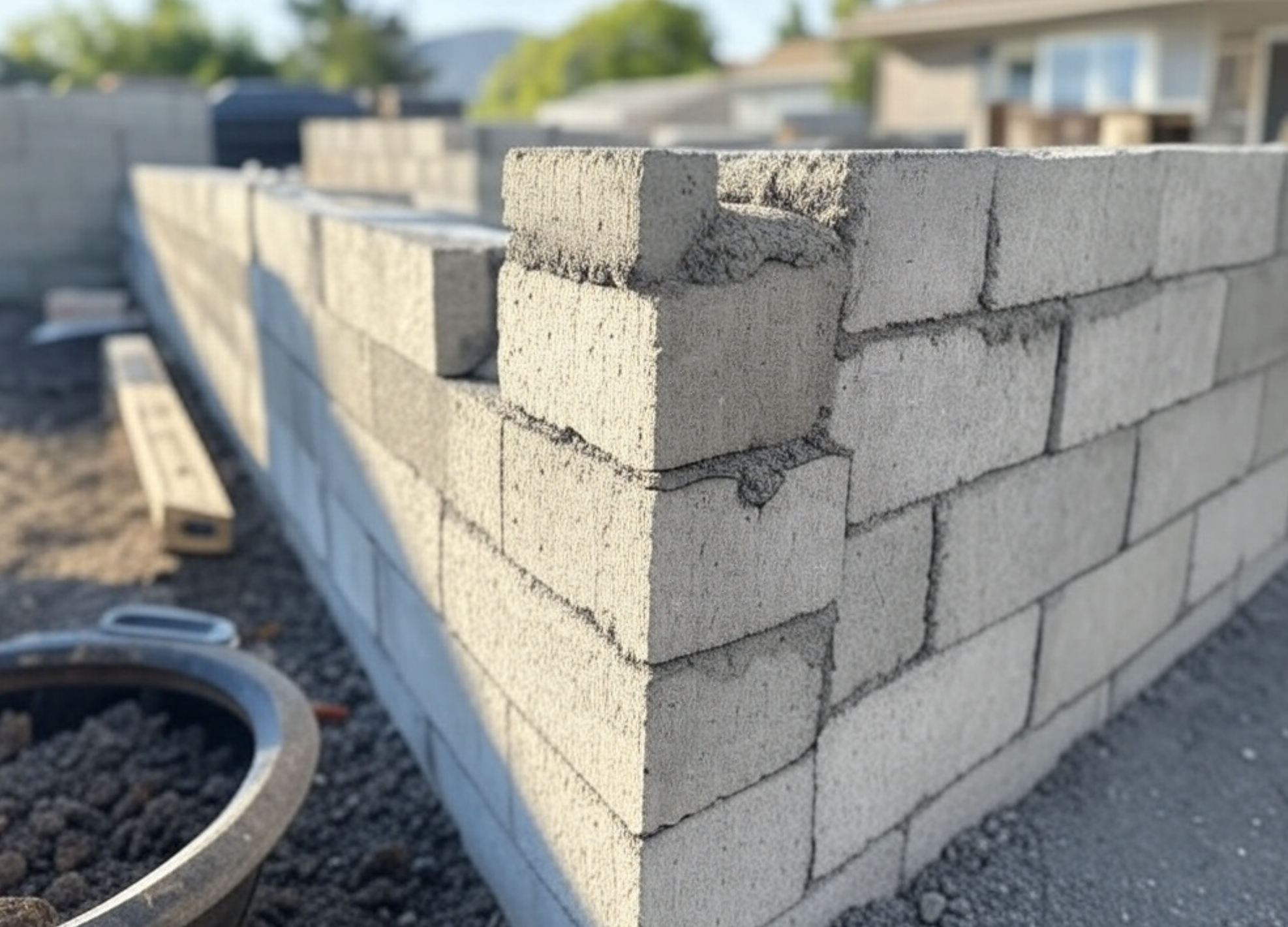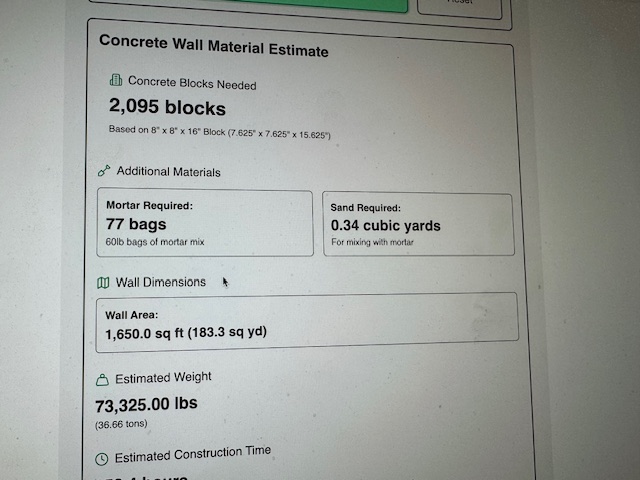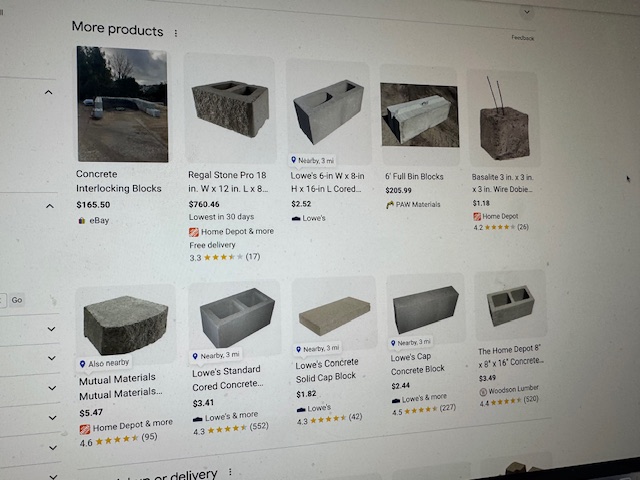Concrete Block Calculator: How Many Blocks Do You Need?
Calculate how many concrete blocks you need for your wall by entering dimensions and block size.
How to Use the Concrete Block Calculator
This calculator gives you a solid estimate on the number of concrete blocks (also called concrete masonry units or CMUs if you want to know the technical terminology) you'll need for projects like building a retaining wall, garden wall, basement, a garage, or other project. Plan your project by calculating the number of blocks, mortar, and sand needed based on wall dimensions and your selected block size.
Step 1: Choose Your Calculation Method
The calculator gives you two ways to find out how many concrete blocks you need.
- Calculate by Wall Dimensions: Enter the height and width of your rectangular wall area.
- Calculate by Area with Openings: Enter the wall dimensions and subtract openings like windows and doors for a more accurate estimate.
Step 2: Enter Your Measurements
Input your wall measurements using your preferred units (feet, inches, yards, meters, or centimeters). Be precise with your measurements to get the most accurate results.

Step 3: Choose Your Block Size
Choose the type of concrete block you plan to use.
- 4" x 8" x 16": Lightweight blocks for non-load-bearing walls or partitions.
- 6" x 8" x 16": Medium-weight blocks for structural walls with moderate load requirements.
- 8" x 8" x 16": Standard blocks for load-bearing walls and structural applications.
- 10" x 8" x 16": Heavy-duty blocks for thicker structural walls.
- 12" x 8" x 16": Extra heavy-duty blocks for maximum structural integrity.
- Half Blocks: 8" x 8" x 8" blocks for corners and special applications.
- Sash Blocks: Specialized blocks with grooves for window frames.
- Lintel Blocks: U-shaped blocks for creating support beams over openings.
- Custom Size: Enter your own block dimensions for specialty blocks.
Step 4: Add Openings (if applicable)
If you're using the "Calculate by Area with Openings" method, you can add windows, doors, and other openings to your wall. This allows the calculator to subtract these areas from your total, giving you a more accurate estimate and maybe even saving you a little money.
Step 5: Enter Block Price (Optional)
To get cost estimates, you can enter the price per concrete block. The calculator will then provide a total material cost estimate for your project. If no price is entered, the tool will return an estimate based on the average price range of $1 - $4 per concrete block according to Estimate Florida Consulting.
Step 6: Calculate and Review Results
Click "Calculate Concrete Blocks" to get each of the results listed below.
- Number of concrete blocks needed for the project.
- Mortar and sand requirements.
- Wall area measurements and net area (when accounting for openings).
- Estimated material weight.
- Estimated construction time based on block size.
- Detailed cost breakdown for blocks, mortar, and sand.
- Information about your selected block type.
Common Concrete Block Applications
Different projects require specific block types to ensure proper function and durability. Here are some examples.
| Project Type | Recommended Block Size | Notes |
|---|---|---|
| Retaining Wall | 8" x 8" x 16" or 12" x 8" x 16" | Thicker blocks for taller walls that may require reinforcement. |
| Garden/Decorative Wall | 4" x 8" x 16" or 6" x 8" x 16" | Lighter blocks for shorter non-structural walls. |
| Basement Wall | 8" x 8" x 16" or 10" x 8" x 16" | Requires waterproofing and typically reinforcement. |
| Garage/Shed | 8" x 8" x 16" | Standard size for most residential outbuildings. |
| Fire Pit | 4" x 8" x 16" or Half Blocks | Use fire-rated blocks for this application. |

How the Concrete Block Calculator Works
Core Calculation Formulas
The calculator uses these formulas to convert your inputs into concrete block counts.
| Calculation | Formula |
|---|---|
| Wall Area | Wall Height × Wall Width |
| Opening Area | Opening Height × Opening Width |
| Net Wall Area | Wall Area - Total Opening Area |
| Block Face Area | Block Height × Block Length |
| Number of Blocks | Net Wall Area ÷ Block Face Area |
| Total Blocks (with waste) | Number of Blocks × 1.05 (5% waste factor) |
| Construction Time | Total Blocks ÷ Blocks per Hour Rate |
Mortar and Sand Calculations
This calculator's metrics are based on the Masonry Estimating Guide by Riverside Brick & Supply, which provides "rule of thumb" calculations for determining the correct amount of materials required for masonry projects. The guide recommends adding a 5-10% waste factor to account for breakage, spillage, and errors, which I've incorporated as a 5% factor in our calculations.
Source: Riverside Brick & Supply Masonry Estimating Guide
| Material | Formula |
|---|---|
| Mortar Volume | Mortar per Block × Total Blocks |
| Mortar Bags | Mortar Volume ÷ 0.6 cubic feet (yield per 60-lb bag) |
| Sand Volume | (Mortar Volume × 0.2) ÷ 27 cubic yards |
Block Laying Rates
The calculator uses the following block laying rates to estimate construction time. If you don't have much experence laying brick this could take you considerably more time. But this is a good ball-park estimate for professionals.
| Block Size (Nominal) | Blocks per Hour | Notes |
|---|---|---|
| 4" x 8" x 16" | 15–18 | Lightweight, faster to lay |
| 6" x 8" x 16" | 13–16 | Moderate weight |
| 8" x 8" x 16" | 12.5–15 | Standard rate |
| 10" x 8" x 16" | 11–13 | Heavier, slightly slower |
| 12" x 8" x 16" | 10–12 | Heaviest, slowest |
| Half blocks (8" x 8" x 8") | 15–18 | Small, quick to place |
| Specialty blocks (sash, lintel) | 8–10 | Requires more precision |
Unit Conversion Formulas
The calculator performs these unit conversions based on your measurement selection.
| Conversion Type | Formula |
|---|---|
| Inches to Feet | Inches ÷ 12 |
| Yards to Feet | Yards × 3 |
| Centimeters to Feet | Centimeters ÷ 30.48 |
| Meters to Feet | Meters × 3.28084 |
| Square Feet to Square Yards | Square Feet ÷ 9 |
| Square Feet to Square Meters | Square Feet ÷ 10.764 |

Step-by-Step Calculation Example
Let's walk through a real-world example to demonstrate how the calculator works. Imagine we're building a garage wall that's 10 feet high by 20 feet wide using standard 8" x 8" x 16" blocks, with a 3' x 7' door opening.
| Calculation Step | Formula | Result |
|---|---|---|
| Calculate Wall Area | 10 ft × 20 ft | 200 sq ft |
| Calculate Door Opening Area | 3 ft × 7 ft | 21 sq ft |
| Calculate Net Wall Area | 200 sq ft - 21 sq ft | 179 sq ft |
| Calculate Block Face Area | (7.625" × 15.625") ÷ 144 | 0.83 sq ft |
| Calculate Blocks Needed | 179 sq ft ÷ 0.83 sq ft | 216 blocks |
| Add 5% Waste Factor | 216 blocks × 1.05 | 227 blocks |
| Calculate Mortar Needed | 0.022 cu ft × 227 blocks | 5 cu ft of mortar (9 bags) |
| Calculate Sand Needed | (5 cu ft × 0.2) ÷ 27 | 0.037 cu yd of sand |
The key to accurate block estimates lies in using the actual block dimensions (not nominal) and accounting for openings in your wall. Remember that concrete blocks have standard dimensions, but their actual sizes are slightly smaller to allow for mortar joints.
Planning other construction projects? You might also find these calculators helpful: Gravel Calculator for walkways and driveways or Sand Calculator for backyard projects.
